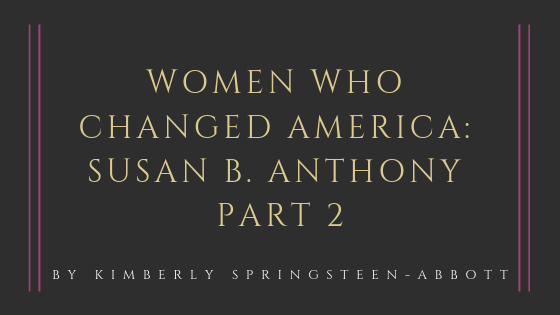The previous article left off when Susan B. Anthony started a newspaper called The Revolution, where she published multiple articles on equal rights for each and every American Citizen, including those who were enslaved. She also spoke out against the horrific practice of lynching and racial prejudice as a whole within her newspaper during this time.
Labor Activist
Susan used her newly-found paper, The Revolution, to publish her ideas about an 8-hour work week along with promoting equal pay for equal work, inspiring immigration to the South for the sake of rebuilding it, and the purchase of American-made goods to bolster the U.S. economy.
Anthony continued to publicly attack labor laws and rules, as well as promote fair labor initiatives between the founding of her paper in 1868 through the late 1890s.
During this period she did a tremendous amount of work for the country and to benefit women’s rights. She persuaded women to initiate a voter referendum for equal pay for equal work as a delegate to the National Labor Conference. Anthony also encouraged women in New York who worked in the sewing trade to form their union (Working Women’s Central Association) as they were not allowed in men’s unions at the time.
In 1870, she was elected president of the Working Women’s Central Association. Then, in 1890 she spoke on the importance of organized labor during her presidency at the Woman Suffrage Association.
Temperance Advocate
As Susan was born into a Quaker household and brought up under Quaker morals & guidelines, she abhorred the use of alcohol from an early age. Her first retaliation against alcohol, was her joining of the Daughters of Temperance, a woman’s rights group who campaigned for more stringent liquor laws and which shed light on the harmful effects alcohol abuse could have on families.
Throughout the years, Anthony continued to petition for stronger liquor laws and bring more awareness to the American public on the destructive nature alcohol can have on the human psyche. The main highlights of her career as a temperance advocate include being elected president to the Daughters of Temperance – Rochester branch in 1849. Then, she co-founded the Women’s State Temperance Society in 1853.
Her platform drew attention to the Abby McFarlane Case, which focused on Abby’s drunken ex-husband’s slaying of the man she married after she had divorced him in 1860. Her other involvements reflected similar views, and she supported and counseled the Women’s Christian Temperance Union as well.

